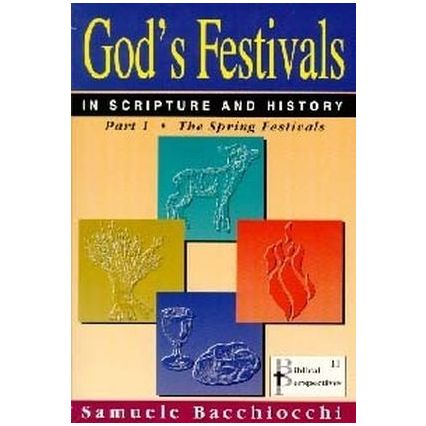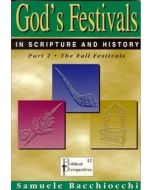God's Festivals in Scripture and History - The Spring Festivals Vol 1
By Samuele Bacchiocchi
Paperback, 252 pages
Biblical Perspectives, 1995
ISBN: 9781930987104
The Christian faith is rooted in the belief that God has acted in human history by creating, redeeming, and ultimately restoring His creatures. These redemptive acts of God are commemorated in the Bible weekly through the Sabbath and annually through the Spring and Fall Festivals. The Spring Festivals of Passover and Pentecost commemorate the redemptive accomplishments of Christ's first Advent, namely, Christ's atoning death. His resurrection, ascension, inauguration of His heavenly ministry, and sending of the Holy Spirit. The Fall Festivals of Trumpets, Atonement, and Tabernacles point to the consummation of redemption, namely, the judgment, the final disposition of sin, the second Advent, and the restoration of this world.
Most evangelical churches no longer observe the annual Biblical Festivals today, partly as a result of the radical anti-feasts attitude of the Puritans, who swept away all religious holy days except the Lord's Day. The Puritans viewed the church calendar, which was filled with saint's days and Marian feasts instituted by the Roman Catholic Church, as indicative of the apostasy into which the church had fallen. To rid the church of all the pagan superstitions which had become part of the popular piety, the Puritans in Colonial America did away with all the annual holy days. In doing so, however, they left Christians without a religious calendar to commemorate the great saving acts of God.
In God's Festivals in Scripture and History, Dr. Samuele Bacchiocchi challenges Christians to bring about worship renewal by developing a church calendar patterned after the religious calendar God gave to Israel. Such a calendar would focus during the course of the year on the redemptive accomplishments of Christ's first and second Advents. We cannot preach the whole Bible in one sermon. We cannot celebrate the whole story of redemption in one Sabbath. A church calendar patterned after the calendar of Israel can help to do justice to all the great saving acts of God.
A church calendar is more than an annual cycle of recurring festivals. It provides an opportunity to experience afresh what God has done in the past, is doing in the present, and will do in the future. It enables us to take the time which God has created and offer it back to God through Jesus Christ who has redeemed it.
Passover in the Old Testament
- Passover in Jewish History
- The Origin of Passover
- The Permanent Passover
- Passover in Temple Days
- Passover: Temporary or Permanent?
- The Witness of the New Testament
- Internal Indicators
Passover in the New Testament
- The Nature and Meaning of the Lord’s Supper
- The Date of the Last Supper
- The Last Supper and the Paschal Lamb
- The Meaning of the Christian Passover
- Passover Symbolism in the Book of Revelation
- The Observance of Passover in the Apostolic Church
- Passover Taken for Granted
- Passover and the Lord’s Supper
- The Influence of Passover in the Christian Life
Passover in the Early Church
- Arguments against the Observance of Holy Days
- Paul and the Holy Days in Colossians 2:16
- Paul and the Holy Days in Romans 14:5
- Paul and the Holy Days in Galatians 4:10
- Passover in the Early Church
- Passover Kept as a Night Vigil
- The Passover Controversy
- Easter-Sunday and Paganism
- Reformers and Easter
The Observance of Passover Today
- The Continuity of Passover in the Christian Church
- The Paschal Nature of the Last Supper
- The Observance of Passover in the Apostolic Church
- The Observance of Passover in the Postapostolic Church
- The Date for the Observance of Passover Today
- The Jewish Lunar Calendar
- Quartodeciman Dating of Passover
- Sunday Dating of Passover
- The Manner of the Observance of Passover
- The Lord’s Supper and the Agape
- Reflecting on the Lamb
- A Passover Service
Pentecost in the Old Testament
- The Reckoning of Pentecost in the Old Testament
- Counting from the Omer
- Two Methods of Reckoning
- The Meaning and Ritual of Pentecost in the Old Testament
- Significance of the Sheaf of First Fruits
- Prophetic Fulfillment of First Fruits
- Pentecost: A Symbol of Remission
- The Giving of the Law
Pentecost in the New Testament
- The Meaning of the Christian Pentecost
- The Timing of Pentecost
- The Manner of Pentecost
- The Inauguration of Christ’s Heavenly Ministry
- The Founding of the Christian Church
- The Bestowal of Spiritual Gifts
- The Observance of Pentecost in the New Testament
- Indirect Indications of Pentecost’s Observance
- Hastening to be in Jerusalem
Pentecost in the Early Church
- The Meaning of Pentecost in the Early Church
- Pentecost: A Fifty-day Period of Rejoicing
- Pentecost as a Feast of Forgiveness
- Pentecost as the Descent of the Holy Spirit
- The Observance of Pentecost in the Early Church
- Season of Rejoicing
- Standing in Prayer as an Emblem of the Resurrection
- Later Developments
The Observance of Pentecost Today
- The Continuity of Pentecost in the Christian Church
- The Date of Pentecost Today
- Ambiguity in the Dating Method
- A Tentative Proposal
- The Meaning of Pentecost Today
- The Observance of Pentecost Today
- A Season to Be Thankful
- “Pentecost Renewal Week”
Share your thoughts with other customers
Write review Contact
Contact![Adventist Book Centre Australia [with ABC Christian Books, Better Books and Food and Christian Life Resources] Adventist Book Centre Australia [with ABC Christian Books, Better Books and Food and Christian Life Resources]](https://adventistbookcentrecomau002.stagingwebsite.au/media/logo/stores/1/Adventist-Book-Centre-Australia-Logo.jpg)



